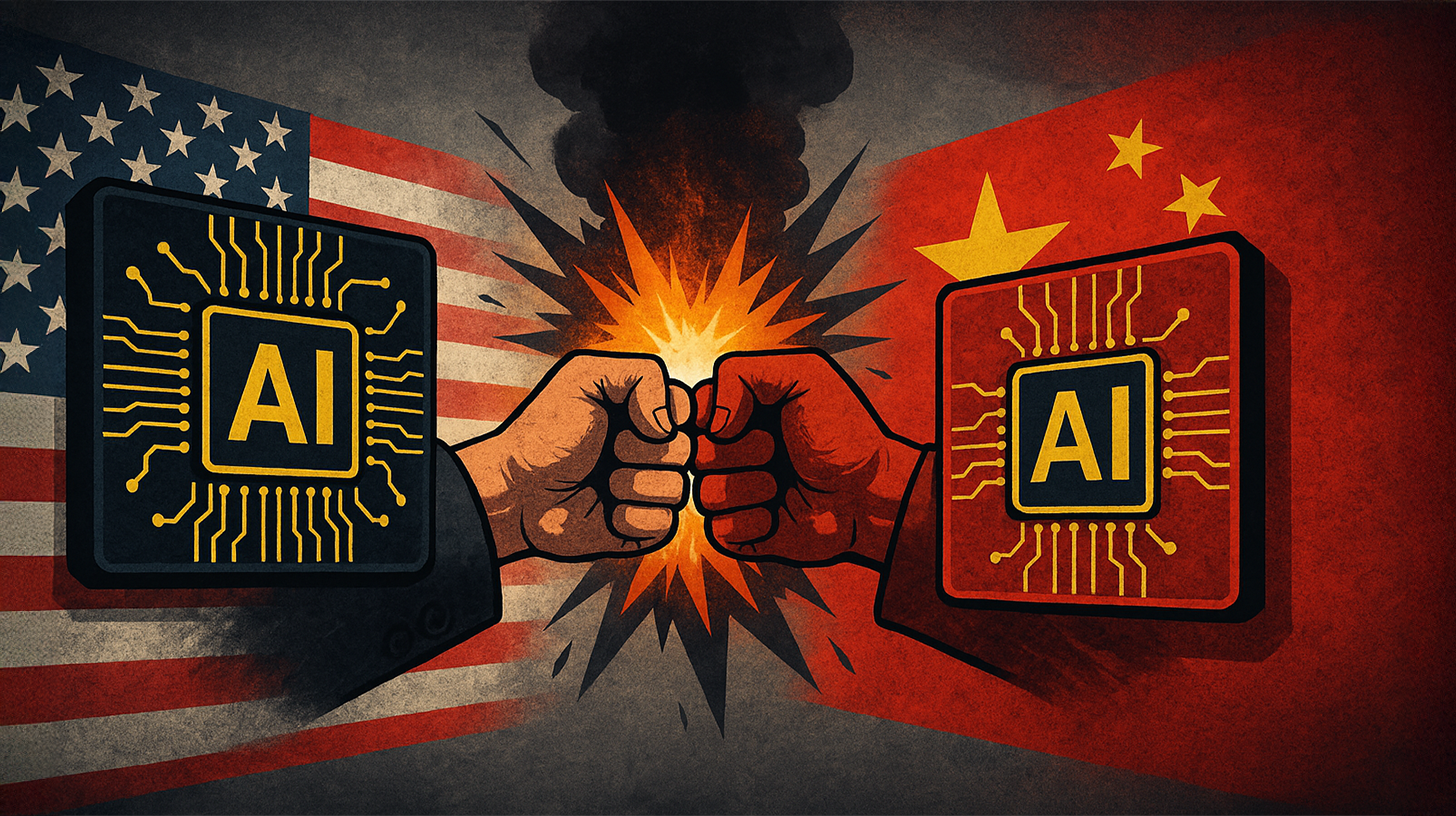
The AI chip war escalates: Nvidia's nightmare? China strikes back with its own AI chips – and Alibaba is just the beginning – Image: Xpert.Digital
AI chips: USA vs. China – Nvidia vs. Alibaba – The battle for technological independence in artificial intelligence
Completely independent of the USA: Alibaba's new AI chip is a challenge to Nvidia
China is intensifying its efforts to become independent of Western technology suppliers and is developing its own alternatives to the dominant American AI chips. At the center of this strategic realignment is not only the state-backed technology group Huawei, but also private companies such as the e-commerce giant Alibaba, which is now introducing its own AI chip produced entirely in China.
Alibaba's breakthrough in chip development
Alibaba, China's largest cloud provider and one of Nvidia's most important customers to date, has developed a new versatile AI chip specifically designed for inference tasks. This chip differs from previous models in that it is manufactured entirely in China, whereas earlier versions were still produced at the Taiwan Semiconductor Manufacturing Company (TSMC) in Taiwan.
The new chip is designed to support a wide range of AI applications, including pre-trained models such as voice assistants and other intelligent systems. Alibaba plans to use both its own chips and continue to use processors from other vendors, such as Nvidia, to pursue a balanced strategy.
This development is directly linked to the company's massive investments in AI infrastructure. Alibaba has announced that it will invest at least 380 billion yuan (approximately $53.1 billion) in building cloud and AI hardware infrastructure over the next three years. These investments are already paying off: Alibaba's cloud business recorded annual revenue growth of 26 percent, with AI-related product revenue posting triple-digit growth for the eighth consecutive month.
The tightened export restrictions of the USA
The development of Chinese in-house production is taking place against the backdrop of increasingly restrictive US export controls. While certain Nvidia chips, such as the H20 model, have been allowed to be sold in China again since July 2025, Beijing has banned their use, citing security concerns. Chinese authorities have expressed concern about possible built-in backdoors in the chips that could allow foreign governments to remotely access or shut down the system.
The US has continuously tightened its control measures. TSMC was ordered to stop supplying chips with structure widths of 7 nanometers or less to Chinese companies. In addition, American chip manufacturers such as Nvidia and AMD must pay 15 percent of their revenue from business in China to the US government.
These restrictions not only affect individual companies, but have systemic effects on the global semiconductor supply chain. Trump has already announced punitive tariffs of up to 125 percent on Chinese goods and is considering additional tariffs on semiconductors and other technology products.
China's broad chip offensive
In addition to Alibaba, other Chinese companies are entering the AI chip market. Shanghai-based startup MetaX presented a chip designed to replace Nvidia's H20 model, offering more memory performance but consuming more power. The company is already preparing for mass production and reported revenue of 743 million yuan for 2024, with a loss of 1.4 billion yuan.
Moore Threads, another emerging Beijing-based company, is planning IPOs with MetaX valued at a combined $1.65 billion. Both companies were founded in 2020 by former executives of American chipmakers and are benefiting from geopolitical tensions that are forcing domestic customers to turn to Chinese GPU products.
Huawei, the state-backed technology giant, has already achieved considerable success with its Cloudmatrix chip cluster. The system combines 384 Ascend AI chips and outperforms Nvidia's NVL72 chip cluster in some areas while consuming less power. The new Ascend 910C chip is said to be on par with Nvidia's A100.
Challenges in domestic production
Despite progress, significant hurdles remain. Chinese factories cannot yet compete with cutting-edge US or Taiwanese manufacturing technology. Companies are therefore resorting to older processes or combining multiple chips to compensate for the lack of computing power.
Training large AI systems is particularly problematic and remains the biggest vulnerability. Engineers report overheating and crashes during long computing processes with domestic processors. While China is making progress in developing chips for inference tasks, i.e., the use of already trained models, the computationally intensive training of new AI models remains a challenge.
A new dimension of digital transformation with 'Managed AI' (Artificial Intelligence) - Platform & B2B Solution | Xpert Consulting
A new dimension of digital transformation with 'Managed AI' (Artificial Intelligence) – Platform & B2B Solution | Xpert Consulting - Image: Xpert.Digital
Here you will learn how your company can implement customized AI solutions quickly, securely, and without high entry barriers.
A Managed AI Platform is your all-round, worry-free package for artificial intelligence. Instead of dealing with complex technology, expensive infrastructure, and lengthy development processes, you receive a turnkey solution tailored to your needs from a specialized partner – often within a few days.
The key benefits at a glance:
⚡ Fast implementation: From idea to operational application in days, not months. We deliver practical solutions that create immediate value.
🔒 Maximum data security: Your sensitive data remains with you. We guarantee secure and compliant processing without sharing data with third parties.
💸 No financial risk: You only pay for results. High upfront investments in hardware, software, or personnel are completely eliminated.
🎯 Focus on your core business: Concentrate on what you do best. We handle the entire technical implementation, operation, and maintenance of your AI solution.
📈 Future-proof & Scalable: Your AI grows with you. We ensure ongoing optimization and scalability, and flexibly adapt the models to new requirements.
More about it here:
China accelerates AI independence: State support, massive chip expansion, and geopolitical race with the US
State support and strategic objectives
The Chinese government is supporting the domestic chip industry with massive investments and regulatory measures. State-owned cloud providers are required to source at least 50 percent of the chips they use from domestic manufacturers. Regulators have issued so-called "window guidance" urging Chinese companies to rely on domestic suppliers such as Huawei and Cambricon instead of Nvidia chips.
China plans to comprehensively integrate artificial intelligence into its economy and society. By 2027, the penetration of new intelligent devices and AI agents is expected to exceed 70 percent in six key areas. By 2030, this figure is expected to exceed 90 percent, and by 2035, China plans to have a fully intelligent economy and society.
The global research landscape
China has also become a global leader in AI research. In 2024, China's publication output in AI research was equivalent to that of the US, UK, and the EU combined. More than 40 percent of global citations are attributable to Chinese AI work. The country has 156 institutions, each of which published more than 50 AI publications in 2024.
The development of the AI chatbot DeepSeek symbolizes China's growing technological independence. The cost-effective, open-source language model demonstrates China's ability to circumvent US chip restrictions and still develop competitive AI systems.
Technological innovations and optimism
Despite the technological challenges, optimism is growing in China. Software innovations and improved chip designs could enable the country to close the gap with the US faster than previously expected. Chinese companies are increasingly relying on homegrown chips and have made significant progress in developing powerful and energy-efficient processors.
China's AI workforce is young, growing rapidly, and ideally positioned for long-term change. Leading companies such as Huawei, Baidu, Alibaba, and Tencent have accelerated their research and development efforts on AI chips, while a growing number of related startups are emerging.
Geopolitical impacts and future prospects
The technological race between China and the US has far-reaching geopolitical implications. Taiwan is at the center of this conflict, as TSMC plays a key role as the world's largest chip manufacturer. The company is investing billions in new factories outside Taiwan to reduce its dependence on its home base and secure supplies to Western industries even in times of crisis.
The US views China as a strategic threat and is continually tightening its export controls. Critics warn that even with scaled-down versions of American flagship chips, China could buy enough to build world-leading AI supercomputers and overtake the US in AI capabilities.
China, for its part, is responding with a comprehensive strategy for technological independence. The People's Republic aims to reach a new stage of development by 2035, in which a fully intelligent economy and society are established. This transformation is intended to make a decisive contribution to the realization of the desired socialist modernization.
Market dynamics and competitive situation
The global AI chip market is undergoing intense competition. Nvidia continues to maintain its dominant position, but is simultaneously developing slimmed-down versions of its chips for the Chinese market. The Blackwell-based processor, tentatively called the B30A, is expected to achieve about half the computing power of the Western flagship B300 model, but would still be several times faster than the current H20 chip.
Chinese manufacturers are taking advantage of the gap created by US restrictions. They are positioning themselves as reliable alternatives to American vendors and building closer relationships with local customers and suppliers. Geopolitical tensions are forcing relevant domestic customers to rely on GPU products produced in China, helping domestic manufacturers gain market share.
The Chinese chip industry is planning a massive expansion of its production capacity. China's chipmakers aim to triple their total production of AI processors next year. One factory for Huawei's AI processors is scheduled to begin production by the end of 2024, and two more are scheduled to come online in 2025.
The battle between China and Nvidia for dominance in AI chips is thus more than just an economic competition. It reflects the broader geopolitical tensions between China and the US and will significantly shape the technological landscape in the coming years. While the US seeks to slow China's technological rise, China is doing everything it can to achieve technological independence and consolidate its position as a global technology power.
We are there for you - advice - planning - implementation - project management
☑️ SME support in strategy, consulting, planning and implementation
☑️ Creation or realignment of the AI strategy
☑️ Pioneer Business Development
I would be happy to serve as your personal advisor.
You can contact me by filling out the contact form below or simply call me on +49 89 89 674 804 (Munich) .
I'm looking forward to our joint project.
Xpert.Digital - Konrad Wolfenstein
Xpert.Digital is a hub for industry with a focus on digitalization, mechanical engineering, logistics/intralogistics and photovoltaics.
With our 360° business development solution, we support well-known companies from new business to after sales.
Market intelligence, smarketing, marketing automation, content development, PR, mail campaigns, personalized social media and lead nurturing are part of our digital tools.
You can find out more at: www.xpert.digital - www.xpert.solar - www.xpert.plus

